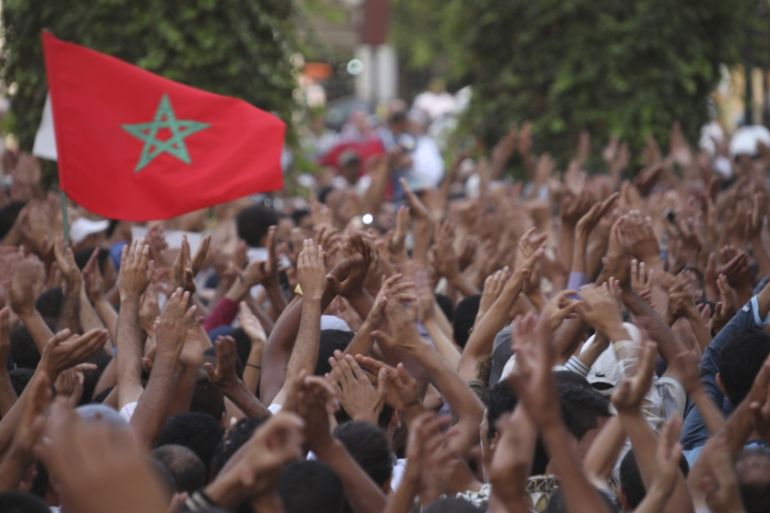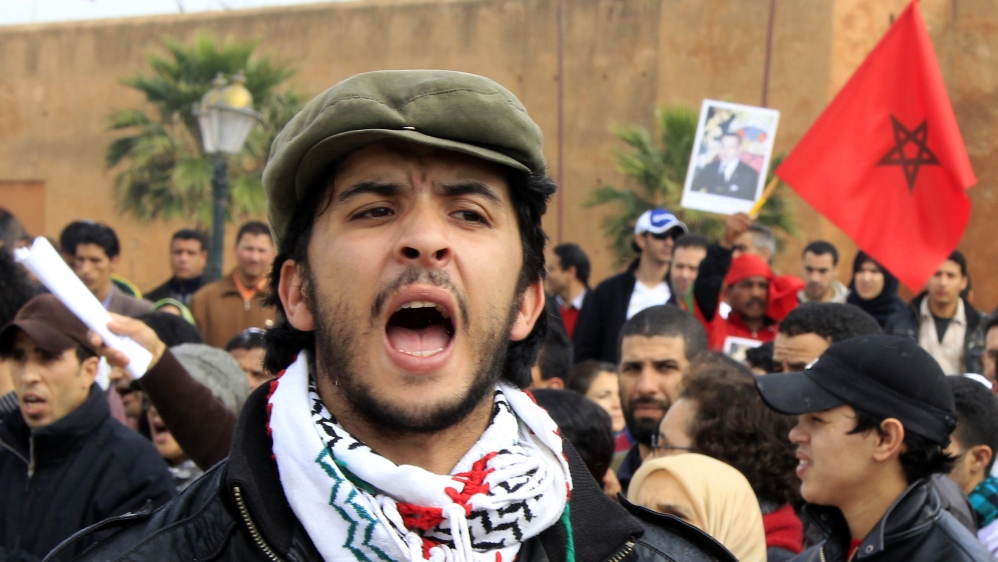Morocco’s February 20 movement: ‘Demands still alive’
Not much has changed since the movement’s inception six years ago, activists say.

Rabat – Over a thousand protesters marched through Morocco ‘s capital city on Sunday to mark the anniversary of the country’s 2011 wave of protests, known as the February 20 Movement, that was inspired by the Arab uprisings taking place in Tunisia and other Arab countries.
Protesters, representing a myriad of political affiliations, rallied under the banner of the February 20 Movement and called for an end to corruption, better housing and employment opportunities, and an end to privatisation of schools, among other demands.
Keep reading
list of 4 itemsPalestinian Prisoner’s Day: How many are still in Israeli detention?
‘Mama we’re dying’: Only able to hear her kids in Gaza in their final days
Europe pledges to boost aid to Sudan on unwelcome war anniversary
As the marchers made their way to the Parliament building, chants began to turn towards the government.
For four months, Morocco’s Prime Minister Abdelilah Benkirane has struggled to agree on a coalition for the national parliament, essentially leaving the country without a functioning government. Moroccans have called this ‘the blockage’.
READ MORE: Where are Morocco’s revolutionary activists?
Nabila Mounib, general-secretary of the Unified Socialist Party, who openly supported the February 20 Movement since its inception, said that Benkirane did well to fight corruption and extortion and faced many obstacles, but was not a strong enough leader these past five years to bring about the needed coalition.
“We have gone full circle in our effort to bring about true democratisation with strong and independent parties,” Mounib told AL Jazeera.
Mounib became the first woman to lead a major Moroccan political party when she took up her post in 2012. When the breakout of protests in 2011 led the King to announce a referendum on a new constitution, she was among those who called for a boycott of what she said was inadequate reform.
“Many things have changed [in the past six years], but not in essence. The constitution failed to fulfil the major demand of the movement, the transition from an executive monarchy to a true parliamentary monarchy. For this reason, protesters have continued to march. The February 20 Movement’s demands are very much still alive.”
READ MORE: The fall and rise of Morocco’s left
Other activists concur. For Oussama El Khlifi, who was a 23-year-old unemployed cyberactivist when the movement erupted, not much has changed since then. “Today, we call for the end of corruption and tyranny, true democratisation, and that power be to the people. As of now, none of these demands have been met.”
The movement, unique in its diversity, initially brought together various factions of the secular Left, independents, and youth from Morocco’s largest Islamist association – the Justice and Charity Group – which is officially banned by the Moroccan monarchy, and which left the movement after only a few months.
The split was made clear this weekend. A Leftist-led march was organised Sunday morning while another, separate, march was organised by the Islamist Justice and Charity later that afternoon, the latter producing the far larger crowd.
Hamza Haddi, a 26-year-old leader in the Leftist march and member of the Moroccan Association for Human Rights, said that no animosity existed between the groups.
“The February 20 March was a popular movement, and they [Justice and Charity] have their specific demands and we have ours, but in the end, we all want the same thing, to end corruption and bring about a more just and fair society.”
Sammy Badran, a Fulbright researcher and PhD candidate from the University of Kansas who studies the movement, says that the ideological differences among the various factions within the movement were not, however, without effect.
“While they worked together initially, there were disagreements and falling outs between Justice and Charity and some Leftists prior to [Justice and Charity’s] withdrawal from the movement. The fact that they demonstrated separately attests to that.”

Besides these two main contingencies, the February 20 Movement was often times a rallying cry for broad-based reform covering a wide range of concerns. “It is a movement for everything that is wrong in Morocco,” says Mounia El Hamdaoui, an undergraduate at Mohamed V University. “I am here because we are living under ‘hogra’,” a phrase often used to mean oppression and unfairness.
|
|
Another organiser, Soukat Saida, talked about her women’s association, based in Rabat’s sister city of Sale, and their struggle to reclaim land that was seized in 2007 for a development project.
“They [the government] bought us out and told us to move. Our land, our homes, and communities – we were forced to leave these all behind,” Saida told Al Jazeera. “We want to know, for this government that claims to defend human rights and dignity, how they can tell us to just pack up and leave?” Saida added. “Where can we leave? We are farmers and people of the land. Where are we to go?”
Protest chants reflected this frustration.
“They lit us on fire and left us to walk naked! No work, no housing, and the corporations get everything!”
Last Tuesday, Benkirane announced that his Justice and Development Party, the first Islamist party to head the government since the emergence of the 2011 uprisings, will form a coalition in the coming weeks.
The announcement came just days before the six-year anniversary marches. But for many protesters, government or not, a deep scepticism remains, and until the basic demands for justice, dignity, and freedom are met, activists vowed the marches will go on.
“For us, street protests are the only way to voice political will and concern,” said El Hamdaoui.